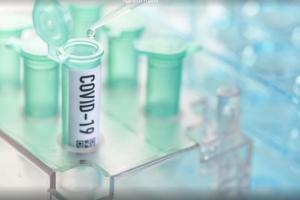Based on evidence collected, experts say global community needs to intensify research on this mode of transmission to avoid a further spread of the virus

Representational picture. Image: iStock
There is a global debate on whether the SARS-CoV-2 virus can be transmitted sexually. The issue was recently discussed at a WHO Global Forum on August 4, in Geneva, where COVID-19's modes of transmission were discussed.
ADVERTISEMENT
Dr Subhash Hira, Professor of Global Health at the University of Washington-Seattle, one of the invitees, insisted that more studies and research are required to prove sexual transmission, which could be a major mode of transmission.

Dr Shivangi Pawar, consulting homoeopath
Dr Michael Ryan, director of Emergency Programs, WHO, and Dr Sowumya Swaminathan, chief scientist, WHO chaired the virtual meeting, attended by over 300 scientists from world over.
Dr Hira told mid-day, "In the virtual meeting, researchers presented scientific studies of various modes of transmission of COVID-19. In a study published in JAMA (Journal of the American Medical Association) in May, the virus was isolated from the semen of 15 per cent of symptomatic COVID-19 patients. A later study in July showed that the virus was detectable in the semen and vaginal secretions of COVID treated patients for up to 35-40 days. These studies need to prove that genital shedding of the virus is infectious. Leaving this sexual mode of transmission as 'unresolved' can lead to a larger public health failure."

Dr Wiqar Shaikh, senior allergy and asthma specialist
"For example, Ebola and ZIKA viruses were found to be sexually transmitted late in those pandemics, and introduction of condoms among infected persons quickly led to control of these epidemics, says Dr. Hira.
"Hence, we must determine the proportion of sexual transmission and then intervene with counselling, condoms and other safe sex techniques," says Dr. Hira, adding that there is a lack of counselling on sexual activity during COVID quarantine and even frontline health workers are unable to think of innovative means to manage sexual activity leading to frustration, domestic violence, and anxiety for years.

Dr Prakash Kothari, Padma Shri Professor of sexual medicine
Based on common situations for sexual activities, irrespective of heterosexual, homosexual or bisexual orientations, there are modified modes and postures of sexual activities but individuals must consult sexologists, psychiatrists, and psychologists for better management.
"When it comes to sex and how to engage in it in the middle of a pandemic, no one seems to have an apt answer. So the need of the hour is to address the elephant in the room" said Dr. Shivangi Pawar, Thane-based consulting homoeopath who specialised in psychiatry. "Your sex life plays a crucial role in maintaining your good health," she said.

Dr Subhash Hira, Professor of Global Health at the University of Washington-Seattle
Dr Wiqar Shaikh, senior allergy and asthma specialist said, "It is already established that the virus spreads through respiratory droplets which can be inhaled through the mouth or nose. So coming in contact with a person through kissing could expose you to the virus or even by touching the mouth or nose, or eyes."
Dr Shaikh added, "If you or your partner is not feeling well or have COVID-19 symptoms, it is advisable to refrain from kissing or having sexual relations. One must also avoid sexual activity in case of comorbidities. The ideal method of sexual gratification is masturbation."

Dr Ketan R Vagholkar, professor of surgery, D Y Patil Medical College
Dr Shaikh said a study in Beijing, China, that showed the virus in the semen of COVID-positive patients indicates the need for further research everywhere, including India.
Dr Ketan Vagholkar, professor of Surgery, DY Patil Medical college, said, "Sexual transmission of COVID-19 has led to a lot of concern and fear in the minds of healthcare professionals. Yet there is no convincing evidence to suggest that sexual transmission can lead to the disease."
When asked how the virus could travel to genital organs, Dr Vagholkar explained that COVID spreads through the circulatory system, reaching multiple organs. However, the virus can overwhelm the normal defense mechanism in the respiratory system and lead to severe symptoms. However, in the other organs, the virus cannot overwhelm their individual defense mechanisms and therefore cannot cause symptoms.
Dr Vagholkar suggested taking the following precautions:
. Inquire if the partner is feeling unwell, or has any COVID symptoms. Maintain contact information to keep track of symptoms that may develop later.
. Take bath with soap and water after sex, do not share soaps. Wear face masks during sex as heavy breathing can create more droplets
. Avoid or limit kissing
. Use barriers such as condoms, lubricants and dental dams during intercourse
Tips for commercial sex workers
Dr Vagholkar added, "Adequate health education has to be given to sex workers at local STD clinics. The same precaution ought to be followed by their clients. If one develops symptoms, they must visit a doctor immediately."
"COVID precautions must be made a way of life. Expectant mothers should continuously consult with attending gynaecologists," said Dr Vagholkar.
Sex Expert speaks
Padma Shri Dr Prakash Kothari, professor, Sexual Medicine, said, "Social (physical distancing) is completely destroyed during a sexual act. COVID transmission through semen is still controversial but it can be prevented best by condoms and by avoiding mouth-to-mouth contact. Rear entry, could be a better position, so you don't come face to face. And of course, wearing masks!"
Dr Hira's summarised recommendations for sexual activity during the COVID-19 pandemic:
(Courtesy Dr. Francisco Cabello/Spain. Consensus on Recommendations for Safe Sexual Activity during the COVID-19 Coronavirus Pandemic. Journal Clinical Medicine 2020, 9, 2297; doi:10.3390/jcm9072297. www.mdpi.com/journal/jcm)
|
Partner/s Living in the Same Household
|
Symptoms |
Recommendation |
|
1. After passing quarantine (28 days) |
No |
Have regular sex. Increase hygiene measures. Encourage communication and sexual creativity.
|
|
2. During quarantine period
|
No |
Sexual activity with a condom and with posterior coital penetrative positions. Increase hygiene measures. Avoid kisses, oral, and anal sex. Encourage communication and sexual creativity
|
|
3. With any suspicious clinical feature at any time |
Any suspected symptoms of COVID-19
|
Avoid coital sexual activity for 28 days. Increase hygiene measures. Self-stimulation (masturbation while simultaneously keeping the safety distance of approximately 2 m), narrate erotic fantasies, share visualizations of erotic scenes, use erotic board games. Encourage communication and sexual creativity.
|
|
4. With positive COVID 19 |
With/without fever |
Avoid coital sexual activity for 28 days (33 days when >60 y.o.age). Isolation in a separate room. Virtual sex with self-stimulation, narrate erotic fantasies, share visualizations of erotic scenes, etc. Encourage communication and sexual creativity.
|
|
5. Pregnant |
No |
Sexual activity with posterior penetrative positions. Increase hygiene measures. Avoid kissing, oral, and anal sex. Use condoms. Encourage communication and sexual creativity.
|
|
6. In contact with COVID-19 patients |
No |
Avoid coital sexual activity. Virtual sex with self-stimulation, narrate erotic fantasies, share visualizations of erotic scenes, etc. Encouraging communication and sexual creativity.
|
|
7. Partner/s not living in the same household/starting a new relationship |
No |
Avoid sporadic couples. Virtual sex activity. Increase hygiene measures. Use of condom, viricide cream, or similar protective method.
|
Keep scrolling to read more news
Catch up on all the latest Mumbai news, crime news, current affairs, and a complete guide from food to things to do and events across Mumbai. Also download the new mid-day Android and iOS apps to get latest updates.
Mid-Day is now on Telegram. Click here to join our channel (@middayinfomedialtd) and stay updated with the latest news
 Subscribe today by clicking the link and stay updated with the latest news!" Click here!
Subscribe today by clicking the link and stay updated with the latest news!" Click here!






